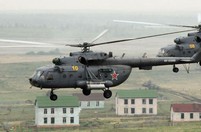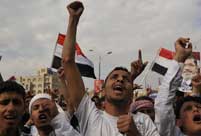 Chinese Air Force's combat group organizes actual-combat training
Chinese Air Force's combat group organizes actual-combat training Demolition of bizarre rooftop villa begins
Demolition of bizarre rooftop villa begins
 Bea Hayden poses for fashion magazine
Bea Hayden poses for fashion magazine
 Indian-controlled Kashmir celebrates Independence Day
Indian-controlled Kashmir celebrates Independence Day
 Left-behind kids' childhood on the side of country road
Left-behind kids' childhood on the side of country road
 'West Lake' in China's Anhui - Pingtian lake
'West Lake' in China's Anhui - Pingtian lake
 How do North Koreans stay cool in summer?
How do North Koreans stay cool in summer?
 China Beijing Int'l Gifts, Premium&Houseware Exhibition opens
China Beijing Int'l Gifts, Premium&Houseware Exhibition opens
 Incredible gardens around the world
Incredible gardens around the world
The organizers of the 2nd Asian Youth Games, which opened on Friday at the Nanjing Olympic Center Stadium, hope to set an example of frugality to young people in accordance with the recent call from leaders to cut back on extravagant spending.
Unlike the magnificent and star-studded ceremonies of most international sports events, the games invited young people to participate to highlight the event as a festival for younger generations, according to Yang Weize, executive chairman of the organizing committee.
It's also lighter on the budget, he added.
According to Yang, the cost of the opening and closing ceremonies is only one-tenth of the cost of sports events of the same size.
"The (international sports event) ceremonies normally involve more than 10,000 performers, but we only have about a thousand, composed mostly of young people instead of stars," he said.
The decision reflected the event's main goal of holding a thrifty event in accordance with the country's new leadership's appeal to cut back on extravagance.
The total budget of the Nanjing Asian Youth Games will be less than 1 billion yuan ($163 million), and ideally under 700 million yuan if possible, Yang said.
Instead of building new facilities, the city is using previously built stadiums.
Only one new rugby stadium, which will open to the public after the games, was built for the Asian Youth Games.
The other 26 stadiums required minor renovations.
According to Cheng Yuan, a publicity officer of the Nanjing Youth Olympic Park, more than two-thirds of the new stadium's seating, about 6,000 seats, are rented, and only about 3,000 are fixed for future use.
"This has saved more than 20 million yuan," she said.
In addition to the rugby stadium, the park will house three more newly constructed venues to be ready for the Youth Olympic Games to be hosted in Nanjing in 2014.
Most of the stadiums' facilities will be temporary and movable, a decision that greatly reduces the cost of the games, according to Cheng.
Since the park will become a fitness center for residents after the games, installing brand new facilities would have been a waste of money, she said.
Considering the high energy and resource consumption of some large-scale stadiums, many of these venues are equipped with energy-saving features, including an external sunshade and water source heat pump, according to the organizer.
To save on air-conditioning costs, staff at the handball stadium at the Nanjing University of Technology are using an alternative method for keeping the temperature cool. They use a box filled with ice to absorb the heat.
"The competition temperature of handball is required to be 24 C," said Leng Qingfeng, manager of the stadium's service team.
"It could have cost us 800,000 yuan if we installed more air conditioners, but by using the ice cubes we can save 600,000 yuan."
In addition to the facilities, organizers have also reduced costs by cutting redundant jobs.
Most of the staff are multi-tasking and many bring their own computers to work, said Cheng.
"We insist on spending every cent to its value in preparation for the games, and we hope, apart from experiencing the sport, that young people will learn the value of being thrifty," Yang said.
The event will close on Aug 24. More than 2,600 athletes from 45 countries and regions will compete in 118 events in 16 sports. Staff serving the games will continue to work for the Youth Olympic Games next year.
 Helicopters, tanks seen during China-Russia joint drill
Helicopters, tanks seen during China-Russia joint drill Conjoined twins separated in groundbreaking surgery
Conjoined twins separated in groundbreaking surgery Cristiano Ronaldo and his beautiful fans
Cristiano Ronaldo and his beautiful fans Morsi supporters demonstrate near Egyptian embassy in Yemen
Morsi supporters demonstrate near Egyptian embassy in Yemen Beijing Int'l Gifts, Premium & Houseware Exhibition opens
Beijing Int'l Gifts, Premium & Houseware Exhibition opens Weekly Sports Photos: A 'Bolt' of lightning flashes across the sky
Weekly Sports Photos: A 'Bolt' of lightning flashes across the sky Escort taskforce holds anti-hijacking drill
Escort taskforce holds anti-hijacking drill Egypt's clashes kill 525 so far
Egypt's clashes kill 525 so far Sex offenders prey on left-behind kids
Sex offenders prey on left-behind kids Jaguar Land Rover to recall 11,852 cars
Jaguar Land Rover to recall 11,852 cars Ballet Swan Lake rehearsed in Taipei
Ballet Swan Lake rehearsed in Taipei  The five Hutong areas of Beijing
The five Hutong areas of BeijingDay|Week|Month